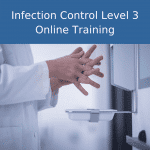Description
Verification of Death Online Training
Our Verification of Death online training course is aimed at nurses working in primary care, supportive care and care homes. It will support the development of your knowledge and skill to competently verify death of adults.
The nurse can understand the procedure to verify death within the contexts of both expected and unexpected death (and the particular considerations for both situations).
It is not limited to any particular setting or situation.
Visit the link: For group verification of death training, this is a face to face training.
- Developed by professionals
- Accredited by The CPD Accreditation
- 100% online, learn at your own time and pace
- Translates into over 100 different languages
- Instant certificate downloaded
What is verification of death?
Verification of death is the process by which a qualified healthcare professional confirms and certifies that an individual has died.
This procedure involves a thorough examination to ensure that there are no signs of life, such as breathing or a pulse. Verification of death ensures a respectful and accurate transition for both the deceased and their loved ones.
It is a vital step in the legal and medical processes that follow a person’s passing, and it is typically carried out by a doctor, nurse, or other authorised healthcare personnel.
Once death is verified, an official death certificate can be issued, enabling the deceased’s family to proceed with necessary arrangements and legal matters.
Who is it for?
The Verification of Death online training is designed for healthcare professionals including:
- Doctors,
- Nurses, and
- Other authorised healthcare personnel responsible for confirming and certifying a person’s death.
The course provides essential knowledge and skills to ensure accurate and proper verification procedures in compliance with legal and medical standards.
When will I get my certificate?
Once you have successfully passed our course you will be able to download and print your certificate immediately.
As this course has been accredited by the CPD Group your certificate will contain the CPD logo and unique reference number.
Key Points on verification of death
- Understand the legal and professional context related to death verification and certification.
- Differentiate between an expected and an unexpected death, and any policies or procedures related to these.
- Develop knowledge, skill and competence to sensitively perform verification of death.
Course Outline: Verification of Death
1. Understand the legal and professional context related to death verification and certification:
- Learn about the legal requirements and guidelines surrounding the verification of death.
- Understand the responsibilities and obligations of healthcare professionals in this process.
- Gain knowledge about the documentation and certification procedures involved.
2. Differentiate between an expected and an unexpected death, and any policies or procedures related to these
- Learn how to recognise the signs and indicators of an expected death.
- Understand the protocols and procedures to follow when dealing with unexpected or sudden deaths.
- Familiarise yourself with any specific policies or guidelines related to different types of deaths.
3. Develop knowledge, skill, and competence to sensitively perform verification of death
- Learn the practical techniques and procedures for verifying death.
- Understand the importance of maintaining dignity and respect during the process.
- Develop the necessary communication skills to interact with family members and provide appropriate support.
4. Enhance your understanding of ethical considerations and cultural sensitivity
- Explore ethical dilemmas that may arise during the verification of death.
- Learn how to navigate cultural and religious sensitivities when dealing with diverse populations.
- Understand the importance of maintaining confidentiality and privacy in the process.
5. Gain confidence in documentation and record-keeping
- Learn how to accurately document the verification of death process.
- Understand the significance of maintaining complete and thorough records.
- Familiarise yourself with any specific documentation requirements or forms.
7. Improve your ability to collaborate and communicate within a multidisciplinary team:
- Learn about the roles and responsibilities of different healthcare professionals involved in the verification of death.
- Develop effective communication strategies to work collaboratively with colleagues.
- Understand the importance of clear and concise communication with the multidisciplinary team.
8. Enhance your overall competence and professionalism in death verification
- Gain the necessary skills and knowledge to perform the verification of death confidently and competently.
- Understand the importance of ongoing professional development in this area.
- Receive guidance and resources to further enhance your competence in death verification.
VOD Course Outcomes
Here are the learning outcomes for the verification of death online course:
- Understanding Law & Ethics: You will grasp the legal and ethical aspects of verifying death.
- Mastering Physical Checks: You’ll become proficient in recognising the physical signs and checks required to confirm death.
- Effective Communication: Enhance your ability to communicate with compassion during the verification process.
- Skills in Documentation: Develop the skills needed to accurately document the verification.
- Procedures and Steps: Gain a comprehensive understanding of the necessary steps and procedures to follow after verification.
- Cultural Awareness: Learn to be sensitive to cultural differences in death practices.
- Self-Care Techniques: Acquire techniques for managing your emotions and well-being.
- Continual Learning: Stay up-to-date on the best practices and legal requirements in this field.
VOD Course Benefits
By taking the verification of death online course, many participants have been able to:
- Develop skills for accurate online death verification.
- Ensure legal compliance and adherence to protocols.
- Improve efficiency and timeliness in the verification process.
- Enable remote accessibility for verifications from any location.
- Enhance communication skills for online interactions with individuals and authorities.
- Contribute to ongoing professional development with a valuable skill set
FAQs on verifying death
Q: Why focus just on expected deaths?
A: Expected deaths have different verification needs than crime/trauma ones. We tailor specifically to natural end-of-life context. You can also register for our blended class which is best suited for nurses wanting to get certified in verification of death.
Q: How much time is classroom based?
A: After intro lectures, most training is hands-on roleplay with detailed practical feedback. This is the reason the practical class is more desired. However, the online verification of death training helps in refreshing the course content. This helps balance knowledge and skills par time.
Q: What physical signs do you teach checking?
A: Core signs like pulse, pupil response, breath checks & reflex tests. Also secondary indicators requiring nuanced observation. Check our practical training in the links above.
Q: Are families included in conversations?
A: Part of the training section includes communication to grieving relatives before, during, and after death verification.
Q: Can you summarise documentation training?
A: Full overview of globally recognised best practices on recording time, physical state, data chain, identifiers, exam steps taken, no vital signs confirmation.





